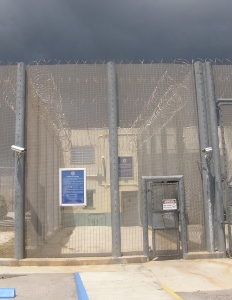Archive for October 24th, 2014

Lifers to get 30 year tariffs
 (CNS): The government has finally addressed the problem of mandatory life sentences without the possibility of parole for murder, which contravenes the Bill of Rights, and set a starting point tariff of 30 years for those given a life sentence. Judges will now have the discretion to impose a higher tariff for aggravating factors or lower in certain circumstances but all lifers will be given a set period of time to be served before they can be considered for release under supervision. The Conditional Release Law, which also deals with a new more controlled release regime under supervision for all her offenders, was passed in the Legislative Assembly on Friday evening with mixed support.
(CNS): The government has finally addressed the problem of mandatory life sentences without the possibility of parole for murder, which contravenes the Bill of Rights, and set a starting point tariff of 30 years for those given a life sentence. Judges will now have the discretion to impose a higher tariff for aggravating factors or lower in certain circumstances but all lifers will be given a set period of time to be served before they can be considered for release under supervision. The Conditional Release Law, which also deals with a new more controlled release regime under supervision for all her offenders, was passed in the Legislative Assembly on Friday evening with mixed support.
Not all MLAs support the tariff but accepted that, given pressure from the UK and the Bill of Rights, the Cayman government had to act and address the issue. The debate about introducing a tariff system has been a long one, and despite opposition from at least one of its own backbenchers as well as some from the opposition benches, the government has finally addressed the problem that was about to see the government challenged in the courts.
Speaking about the law, which will completely change how all prisoners serve their sentences and how they are treated when released, the premier confirmed that over the next two years all of the people currently serving life sentences will have their cases reviewed by the Grand Court and all of the lifers in HMP Northward will be given tariffs, which will be revealed in open court.
See the new bill below and check back to CNS later for more from the debate in the LA.

Would-be robbers hit on Brac
 (CNS): A woman on Cayman Brac received minor injuries on Wednesday when she was slammed against her car and pushed to the ground by two masked men, police revealed Friday. What appears to be an attempted robbery took place outside the victim’s home in West End, Cayman Brac, but nothing was stolen as the would-be robbers were scared off when a neighbour intervened. The incident happened as the woman was getting out hercar outside her residence at about 9:15 in the evening when she was forcibly shoved against her vehicle before the men ran off towards Market Place on foot.
(CNS): A woman on Cayman Brac received minor injuries on Wednesday when she was slammed against her car and pushed to the ground by two masked men, police revealed Friday. What appears to be an attempted robbery took place outside the victim’s home in West End, Cayman Brac, but nothing was stolen as the would-be robbers were scared off when a neighbour intervened. The incident happened as the woman was getting out hercar outside her residence at about 9:15 in the evening when she was forcibly shoved against her vehicle before the men ran off towards Market Place on foot.
Although street robberies are increasingly common on Grand Cayman, they are still rare on the Brac. This incident is bound to raise public concern that the rising crime on the most populated island is spilling over into the Brac.
Police confirmed that the men were not believed to be armed with any weapons and were described as medium build and average height. Neither of the masked men spoke during the foiled robbery attempt.
An RCIPS spokesperson said the matter is now under investigation by officers from the Cayman Brac Police Station and anyone with information is asked to call CBPS at 948 0331, RCIPS tip-line 949-7777 or Crime Stoppers on 800 8477(TIPS).

JP regulations not in force
 (CNS): Although government committed to regularizing and training justices of the peace as well as implementing a code of conduct to prevent police using JPs with no legal knowledge to sign questionable warrants, the new regime has not been implemented. A local attorney who is trying to complain about yet another failure of procedure regarding a warrant has been told that his complaint cannot be addressed because, despite public announcements about their implementation, the regulations are not in force. The need to address the JP system was also one of a list of conditions from the FCO in 2009 tied to its approval of the UDP government’s borrowing in the 2010 budget.
(CNS): Although government committed to regularizing and training justices of the peace as well as implementing a code of conduct to prevent police using JPs with no legal knowledge to sign questionable warrants, the new regime has not been implemented. A local attorney who is trying to complain about yet another failure of procedure regarding a warrant has been told that his complaint cannot be addressed because, despite public announcements about their implementation, the regulations are not in force. The need to address the JP system was also one of a list of conditions from the FCO in 2009 tied to its approval of the UDP government’s borrowing in the 2010 budget.
Five years later, despite announcements regarding a new regime and training for all JPs, the creation of a code of conduct, as well as a commitment from the police to only use judges, magistrates or JPs with legal qualifications for warrants, it appears that JPs who have no understanding of law continue to sign off on warrants with no questions asked.
Criminal defence attorney, Peter Polack, said it took three months for Legal Services and Judicial Administration to advise him that the JP regulations are not in force. With a criminal complaint pending over a warrant signed by a JP incorrectly and not in line with procedure, leading to an illegal search, Polack has reported his concerns the complaints commissioner and now the deputy governor.
The case, which deals with a client of Polack’s facing charges relating to drug offences, is now expected to be delayed as a result of the failure of anyone to address his complaint because of the claims that there are still no rules relating to JPs. Polack is now planning to summon the deputy governor in his client’s case in Summary Court next month.
The latest failing in government’s management systems comes after a long questionable history about the misuse of JPs by the police in various circumstances. This first came to the public’s attention in a significant way following the arrest of a high court judge, some six years ago, during the now infamous Operation Tempura internal police probe.
Grand Court Judge Alexander Henderson was arrested on24 September 2008 on suspicion of misconduct in public office based on a warrant signed by Carson Ebanks, a JP who had no legal qualifications and did not understand the law. A court later found that the judge was arrested unlawfully and was awarded damages from the public purse in excess of $1.2 million.
Along with a number of other infringements over the years, further problems were exposed in a more recent case. Local activist Sandra Catron, while defending herself in a judicial review after she was arrested for crimes relating to the misuse of an ICT network, also demonstrated that police were using JPs with absolutely no comprehension of the laws relating to the warrants they were signing.
In her case, the court heard that the JP had never once refused to sign a warrant or question anything to do with them over the course of two decades. He also admitted knowing nothing about the law, the evidence or anything else relating to the warrant he had signed. As a result the warrant was thrown out.
Despite assurances from the RCIPS and the deputy governor’s office that things would change, Polack’s client was arrested and his home searched under what turned out to be yet another illegal warrant.
The failure to implement the regulations leaves the public without any course of redress when the police continue to execute illegal warrants, misuse of power by the police and ultimately possible miscarriages of justice. With the implementation of the Bill of Rights in the Cayman constitution, it also exposes government and the public purse to potentially very costly human rights challenges.
The new JP regime was also noted in a letter from Chris Bryant, the then overseas territories minister, in 2009 approving the 2010 budget on the basis of a number of conditions.
The new regulations establish a Code of Conduct for Justices of the Peace and a procedure for making a complaint about their conduct. Five years later there is still no such regulations in place and nothing to prevent abuse.

CIG has ‘plan’ for accounts
 (CNS): The Cayman Islands Government has worked out a plan to produce its first set of Entire Public Sector statements (EPS) in more than a decade but it is not clear when any consolidated accounts will be made public. The auditor general has stated that he will be commenting soon on how close government is to producing a full set of accounts and a report on those accounts that would give the public a true picture of how government spends the fees and taxes it collects from people and businesses. Alastair Swarbrick said that while there was no certainty there would be a report that the public could see, government had, for the first time since the Public Management and Finance Law was passed, set out “a plan” to get there.
(CNS): The Cayman Islands Government has worked out a plan to produce its first set of Entire Public Sector statements (EPS) in more than a decade but it is not clear when any consolidated accounts will be made public. The auditor general has stated that he will be commenting soon on how close government is to producing a full set of accounts and a report on those accounts that would give the public a true picture of how government spends the fees and taxes it collects from people and businesses. Alastair Swarbrick said that while there was no certainty there would be a report that the public could see, government had, for the first time since the Public Management and Finance Law was passed, set out “a plan” to get there.
Although government has been making claims for several years that it was in a position to produce a full set of consolidated accounts, so far what it has presented has been unauditable, falling far short ofwhat is required for an entire public sector statement. Swarbrick said at a press conference this week that his office has signed off on the financial statements for the years 2008-2011 and the last of those has some form of report, but he said he did not want to comment on the quality of those reports yet.
The auditor was, however, hopeful of future change.
“For the first time we’ve got a plan from the Ministry of Finance on how they are going to address the EPS and drive it forward, which is a significant first step and something we have been calling for for at least four years,” he said.
In his latest damming report about the ongoing failure by CIG to account for the three quarters of a billion dollars of public money it spends each year, Swarbrick was more direct than he has ever been about the situation. He pointed fingers at chief officers for their failings in ensuring that their staff comply with the law to produce transparent and accurate accounts for the cash their public government departments spend. Despite being this direct about the root of the problem, Swarbrick said he would have to wait and see if any action was taken to move people out of jobs that they cannot do or that changes that have been made will have any positive impact
Since his comments, Deputy Governor Franz Manderson and Financial Secretary Ken Jefferson, who are now ultimately responsible for this issue, have remained silent about the core problems that are preventing the various entities that are required to produce accounts from doing so in line with the law.
Although Swarbrick has seen an improvement in the number of entities that produce and submit accounts for audit, in the end there are still myriad problems across core government and its authorities and companies, in particular with the quality of information.
Since Dan Duguay first raised his concerns about the mounting problems government was having producing its accounts back in 2008, more than six years ago, government has continued to struggle to address what Duguay said then was a national crisis.
Despite the investment in accountancy SWOT teams, consultants, assistance from the UK, the establishment of committees, a constant public spotlight on the issue, pressure from the Legislative Assembly’s Public Accounts Committee and statement after statement from the public sector leadership about its efforts to improve, the fundamental question of when the people of the Cayman Islands will have a true and accurate picture of how their money is being spent remains unanswered.
CNS posed this question to the auditor general at a press briefing on Monday, and although Swarbrick said he was hoping there might be something the public could see next year, he directed the question to the civil service bosses responsible. CNS submitted the question to Kenneth Jefferson and Franz Manderson on Monday afternoon and we are still awaiting a response.
The last set of consolidate government statements produced reflected the year ending 30 June 2004. But since Hurricane Ivan and, more importantly, since the implementation of the PMFL, the government has failed to account for tax payers' money.
Swarbrick pointed out that although government is perfectly able to produce the budget statements it needs each year to appropriate the money from the people to allocate it to public sector services, CIG has proved entirely incapable of accounting for it afterwards.
The auditor general said he is seeing the political will now in the Finance Ministry to address the real problems, but in many instances the issue is directly related to personnel matters and the competency levels of people keeping government’s books.
“There have been efforts made to move things forward but my concern is there has to be more done to address the control environments,” Swarbrick said Monday. He explained that because proper processes are not followed or becausegovernment departments do not manage their spending properly, it is not possible to then produce the information required for the year end accounts.
“I am hopeful that we will see some action from the PAC to keep reviewing their progress,” he said, as he urged legislators to put on more pressure on government to be transparent and accountable for the use of public cash.